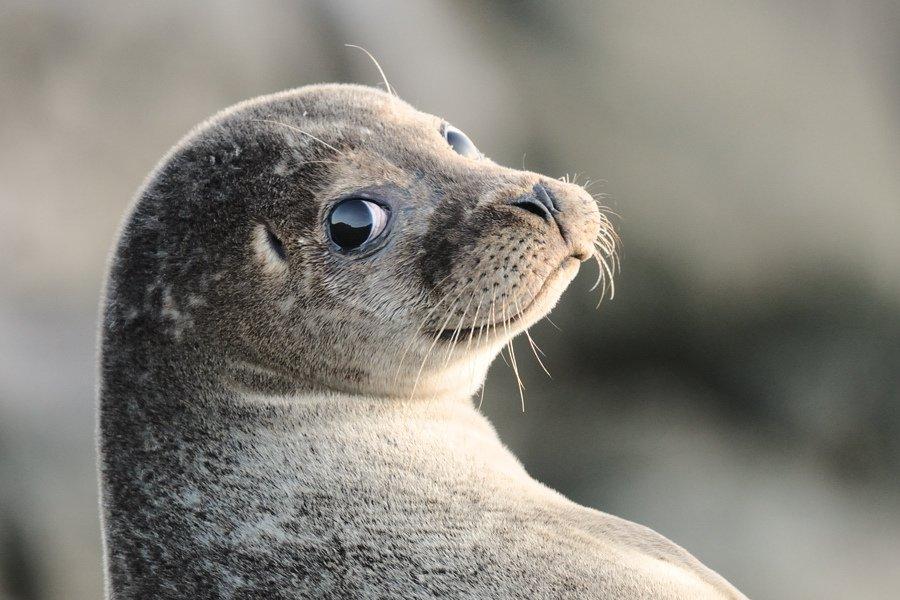Caspian seal. Will it survive?

By Shukur Mammadaliyev
The Caspian seal is one of the smallest members of the earless seal family and unique in that it is found exclusively in the brackish Caspian Sea. They are found not only along the shorelines, but also on the many rocky islands and floating blocks of ice that dot the Caspian Sea.
In winter, and cooler parts of the spring and autumn season, these marine mammals populate the Northern Caspian. As the ice melts in the warmer season, they can be found, as well as the southern latitudes of the Caspian where cooler waters can be found due to greater depth.
This seal is the only marine mammal in the Caspian Sea, and is found nowhere else in the world. At the start of the 20th century there were around 1 million Caspian seals (or about 2.5 seals per square km of the sea). Today the numbers are approximately one tenth of that. The damage inflicted is all too obvious. And this specie considered as under threat of extinction.
Why population of Caspian Seal is reducing? There are different reasons for that. Imagine the devastation that would result if a fire swept through your home. All your possessions—furniture, clothing, personal treasures, and other mementos—would be lost. Your life would be drastically changed. That is essentially what has happened to the Caspian seal’s home. Pollution, industry, and other human activities have led to the destruction of much of the seal’s natural habitat. Moreover, the Caspian seal’s food supply has been greatly diminished by overfishing.
Since Caspian seals are near the top of the food chain, some scientists suggest that this sea mammal is an “indicator species.” This means that if they aren’t doing well, it’s a good indicator that the rest of the food chain isn’t doing well either. If this proves to be so, the situation does not bode well for the preservation of the Caspian’s ecosystem, for the seal is region’s most endangered species.
Several recent cases of large numbers of Caspian seals dying due to canine distemper virus have been reported, in 1997, 2000, and 2001. In April 2000, a mass die-off of Caspian seals was first reported near the mouth of the Ural River in Kazakhstan. It spread south to the Mangistau region, and by the end of May, more than 10,000 seals had died along the Kazakhstan coast. High death rates were also recorded in May and June along the Absheron peninsula of Azerbaijan and the Turkmenistan coast.
Ironically, humans are theirs greatest threat, and at the same time, they are their greatest supporters. Some private and governmental efforts of Caspian states are made to protect the seals. Numerous field studies have been conducted to learn how to help these magnificent animals.
As far as we know, there is currently no common approach to the protection of the Caspian Sea ecosystems in the coastal states, and five different countries are trying to implement their projects on their own. But this work is not enough. It is necessary to conduct complex studies of ecosystem of the Caspian Sea by all states.
Further programs for the protection of marine ecosystems in different countries should be adopted only as a result of such intergovernmental work. The program in each country will have its own specifics and will be aimed at preserving the part of the sea that belongs to this country. But such national programs can be based only on interstate scientific research of the sea as a whole.
It is also important to create an interstate program to conserve the resources of the sea, without this, no significant results are expected. For example, the rules for catching fish in different countries cannot be established by studying bio resources only within the limits of one country. It is necessary to radically revise these rules. The wrong approach has already led to the fact that the once-richest fish resources of the Caspian Sea are now practically undermined, the populations of sturgeons that seemed limitless have practically disappeared, and rarely can anyone as well as seals remember when they last time ate real black caviar.
--
Follow us on Twitter @AzerNewsAz
Here we are to serve you with news right now. It does not cost much, but worth your attention.
Choose to support open, independent, quality journalism and subscribe on a monthly basis.
By subscribing to our online newspaper, you can have full digital access to all news, analysis, and much more.
You can also follow AzerNEWS on Twitter @AzerNewsAz or Facebook @AzerNewsNewspaper
Thank you!
